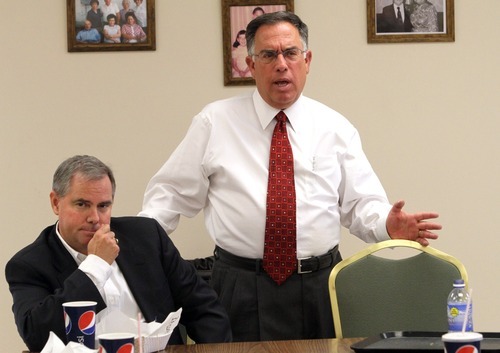This is an archived article that was published on sltrib.com in 2011, and information in the article may be outdated. It is provided only for personal research purposes and may not be reprinted.
In just a few months, a closed liquor store in Salt Lake City has cost the state $120,000 in lost sales, which the state's former liquor board chairman said Tuesday confirms assertions that Utah won't save money by shutting down profitable alcohol outlets and letting workers go.
Sam Granato told Rotarians at a meeting in Salt Lake City that the store at 1457 S. Main St. shuttered March 31 is costing Utahns on two fronts because until 2019 the state will be paying off bonds used to build it, even as profits it generated are being lost.
"That's your money and my money, and it doesn't make any sense," Granato told the receptive crowd. "This was a store that was making $3 million in retail sales annually."
Legislative auditors' insistence that increased sales at nearby liquor stores would make up for lost sales at the Main Street location have proved wrong, said Granato, who was the only one of the five-member liquor-control board to vote against the closure and whose four-year term ended July 1. Several stores were targeted for closure at legislators' direction, ostensibly as a way to cut spending by the Department of Alcoholic Beverage Control to help make up for the state's budget shortfall.
Although four stores have seen a pick-up in business, the state has lost $2,510 in decreased daily sales over a two-month period — representing a 26.5 percent drop in revenue generated by the shuttered store, according to a report by the Utah Department of Alcoholic Beverage Control.
Sen. Ben McAdams, D-Salt Lake City, said he is taking the revenue results to legislative colleagues in hopes that lawmakers will consider reopening the store.
Costs to operate the store were $216,000 annually, compared with the nearly $1.3 million in profits it generated.
"What the state lost in sales was more than enough to operate the store," said McAdams. "If we are going to regulate alcohol, we have a duty to maintain a level of convenience and access to people who drink."
The Salt Lake City store was the first of as many as nine stores set for closure. A public outcry forced lawmakers to keep open all but the Main Street store, at least through February.
Senate President Michael Waddoups said Tuesday more information is needed to determine if the Main Street closure was warranted.
"The greater question isn't how much money has been lost, but is there now less drunk driving and fewer minors drinking alcohol," said Waddoups, R-Taylorsville. "If the closure is impacting public safety for the better, then that's a good thing."
While recounting a history of liquor enforcement, Granato told The Rotary Club of Salt Lake City that in his opinion alcohol sales and consumption are being regulated in a responsible manner. He singled out programs such as ParentsEmpowered, which helped bring down the number of imbibing minors.
He also said alcohol sales are big business in Utah, bringing more than $100 million into state and local treasuries each year, which resonated with many in his audience.
"Sam Granato is a voice for the people, and I can only hope the Legislature listens," said Rotarian Ted Slagg. "I am a nondrinker, but I know how important tourism is to this state. We should be able to accommodate tourists and the people who live here."
Said Rotarian Rhoda Ramsey: "The Legislature needs to wise up. Alcohol is big business."
Twitter@DawnHouseTrib —
Lost liquor sales
The state has lost $120,000 in alcohol sales since the liquor outlet at 1457 S. Main Street in Salt Lake City closed March 31.
Although four nearby alcohol outlets picked up some business, the state lost 26.5 percent in revenue generated by the shuttered store.
Source: Utah Department of Alcoholic Beverage Control.



